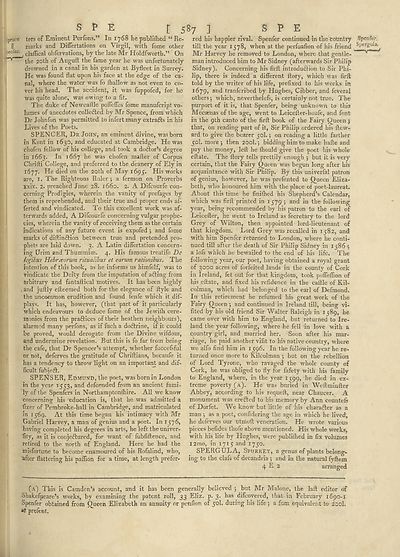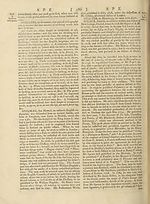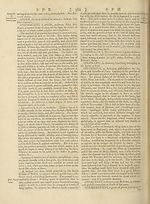Encyclopaedia Britannica, or, a Dictionary of arts, sciences, and miscellaneous literature : enlarged and improved. Illustrated with nearly six hundred engravings > Volume 19, Scripture-SUG
(637) Page 587
Download files
Complete book:
Individual page:
Thumbnail gallery: Grid view | List view

: nr-iiee
II
lenfer.
S P E [5
lers of Eminent Perfons.” In 1768 he pubMied “ Re¬
marks and Differtations on Virgil, with fome other
cladical obfervations, by the late Mr Holdfworth.” On
the 20th of Auguft the fame year he was unfortunately
drowned in a canal in his garden at Byfleet in Surrey.
He was found flat upon his face at the edge of the ca¬
nal, where the water was fo (hallow as not even to co¬
ver his head. The accident, it was fuppofed, for he
was quite alone, was owing to a fit.
The duke of Newcaflle poflefles fome manufcript vo¬
lumes of anecdotes collefted by Mr Spence, from which
Dr Johnfon was permitted to infertmany extra&s in his
Lives of the Poets.
SPENCER, Dr John, an eminent divine, was born
in Kent in 1630, and educated at Cambridge. He was
chofen fellow of his college, and took a doftor’s degree
in 1663. In 1667 he was chofen mafter of Corpus
Chrifti College, and preferred to the deanery of Ely in
1677. He died on the 20th of May 1695. His works
are, I. The Righteous Ruler •, a fermon on Proverbs
Xxix. 2. preached June 28. 1660. 2. A Difcourfe con¬
cerning Prodigies, wherein the vanity of prefages by
them is reprehended, and their true and proper ends af-
ferted and vindicated. To this excellent work was af¬
terwards added, A Difcourfe concerning vulgar prophe¬
cies, wherein the vanity of receiving them as the certain
indications of any future event is expofed j and fome
marks of diftinftion between true and pretended pro¬
phets are laid down. 3. A Latin diflertation concern¬
ing Urim and Thummim. 4. His famous treatife De
legibus Hebrceorum ritualibus et earum rationibus. The
intention of this book, as he informs us himfelf, was to
vindicate the Deity from the imputation of adting from
arbitrary and fantaftical motives. It has been highly
, and juftly efteemed both for the elegance of ftyle and
the uncommon erudition and found fenfe which it dif-
plays. It has, however, (that part of it particularly
which endeavours to deduce fome of the Jewifh cere¬
monies from the practices of their heathen neighbours),
alarmed many perfons, as if fuch a dodflrine, if it could
be proved, would derogate from the Divine wifdom,
and undermine revelation. But this is fo far from being
the cafe, that Dr Spencer’s attempt, whether fuccefsful
or not, deferves the gratitude of Chriftians, becaufe it
has a tendency to throw light on an important and dif¬
ficult fubiefh
SPENSER, Edmund, the poet, was born in London
in the year 15^3, and defcended from an ancient fami¬
ly of the Spenfers in Northamptonfliire. All we know
concerning his education is, that he was admitted a
fizer of Pembroke-hall in Cambridge, and matriculated
in 1569. At this time began his intimacy with Mr
Gabriel Harvey, a man of genius and a poet. In 1576*
having completed his degrees in arts, he left the univer¬
sity, as it is conjectured, for want of fubfiftence, and
retired to the north of England. Here he had the
misfortune to become enamoured of his Rofalind, who,
“after flattering his paffion for a time, at length prefer-
87 ] SEE
red his happier rival. Spenfer continued in the fcotmtry Spenfer,
till the year 1578, when at the perfuafion of his friend Sl]crgulag
Mr Harvey he removed to London, where that gentle¬
man introduced him to Mr Sidney (afterwards Sir Philip
Sidney). Concerning his firfl: introduction to Sir Phi¬
lip, there is indeed a different flory, which was firfl;
told by the writer of his life, prefixed to his works in
1679, and tranfcribed by Hughes, Cibber, and feveral
others j which, neverthelefs, is certainly not true. The
purport of it is, that Spenfer, being unknown to this
Mecaenas of the age, went to Leicefter-houfe, and fent
in the 9th canto of the firfl: book of the Fairy Queen $
that, on reading part of it, Sir Philip ordered his ftew-
ard to give the bearer 50I.; on reading a little farther
50I. more j then 200I.J bidding him to make hafte and
pay the money, left he fhould give the poet his whole
eftate. The ftory tells prettily enough j but it is very
certain, that the Fairy Queen was begun long after his
acquaintance with Sir Philip. By this univerfal patron
of genius, however, he was prefented to Queen Eliza¬
beth, who honoured him with the place of poet-laureat.
About this time he finifhed his Shepherd’s Calendar,
which was firft printed in 1579 ; and in the following
year, being recommended by his patron to the earl of
Leicefter, he went to Ireland as fecretary to the lord
Grey of Wilton, then appointed lord-lieutenant of
that kingdom. Lord Grey was recalled in 1582, and
with him Spenfer returned to London, where he conti¬
nued till after the death of Sir Philip Sidney in 1586 -j
a lofs which he bewailed to the end of his life. The
following year, our poet, having obtained a royal grant
of 3000 acres of forfeited lands in the county of Cork
in Ireland, fet out for that kingdom, took poffeflion of
his eftate, and fixed his refidence in the caftle of Kil-
colman, which had belonged to the earl of Defmond.
In this retirement he refumed his great work of the
Fairy Queen •, and continued in Ireland till, being vi-
fited by his old friend Sir Walter Raleigh in 1389, he
came over with him to England, but returned to Ire¬
land the year following, where he fell in love with a
country girl, and married her. Soon after his mar¬
riage, he paid another vifit to his native country, where
we alfo find him in 1596. In the following year he re¬
turned once more to Kilcolman ; but on the rebellion
of Lord Tyrone, who ravaged the whole county of
Cork, he was obliged to fly for fafety with his family
to England, where, in the year 1599, he died in ex¬
treme poverty (a). He wfas buried in Weftminfter
Abbey, according to his requeft, near Chaucer. A
monument was eredled to his memory by Ann countefs
of Dorfet. We knorv but little of his chara&er as a
man ; as a poet, confidering the age in which he lived,
he deferves our utmoft veneration. He wrote various
pieces befides thofe above mentioned. His whole works,
wdth his life by Hughes, were publiftied in fix volumes
I2mo, in 1715 and 1750.
SPERGULA, Spurrey, a genus of plants belong¬
ing to the clafs of decandria ; and in the natural fyftem
4 E 2 arranged
(a) This is Camden’s account, and it has been generally believed j but Mr Malone, the lafl: editor of
Shakefpeare’s works, by examining the patent roll, 33 Eliz. p. 3. has difeovered, that in February 1690-1
Spenfer obtained from Queen Elizabeth an annuity or penfion of 50I. during his life ; a fum equivalent to 2ool.
at prefent.
II
lenfer.
S P E [5
lers of Eminent Perfons.” In 1768 he pubMied “ Re¬
marks and Differtations on Virgil, with fome other
cladical obfervations, by the late Mr Holdfworth.” On
the 20th of Auguft the fame year he was unfortunately
drowned in a canal in his garden at Byfleet in Surrey.
He was found flat upon his face at the edge of the ca¬
nal, where the water was fo (hallow as not even to co¬
ver his head. The accident, it was fuppofed, for he
was quite alone, was owing to a fit.
The duke of Newcaflle poflefles fome manufcript vo¬
lumes of anecdotes collefted by Mr Spence, from which
Dr Johnfon was permitted to infertmany extra&s in his
Lives of the Poets.
SPENCER, Dr John, an eminent divine, was born
in Kent in 1630, and educated at Cambridge. He was
chofen fellow of his college, and took a doftor’s degree
in 1663. In 1667 he was chofen mafter of Corpus
Chrifti College, and preferred to the deanery of Ely in
1677. He died on the 20th of May 1695. His works
are, I. The Righteous Ruler •, a fermon on Proverbs
Xxix. 2. preached June 28. 1660. 2. A Difcourfe con¬
cerning Prodigies, wherein the vanity of prefages by
them is reprehended, and their true and proper ends af-
ferted and vindicated. To this excellent work was af¬
terwards added, A Difcourfe concerning vulgar prophe¬
cies, wherein the vanity of receiving them as the certain
indications of any future event is expofed j and fome
marks of diftinftion between true and pretended pro¬
phets are laid down. 3. A Latin diflertation concern¬
ing Urim and Thummim. 4. His famous treatife De
legibus Hebrceorum ritualibus et earum rationibus. The
intention of this book, as he informs us himfelf, was to
vindicate the Deity from the imputation of adting from
arbitrary and fantaftical motives. It has been highly
, and juftly efteemed both for the elegance of ftyle and
the uncommon erudition and found fenfe which it dif-
plays. It has, however, (that part of it particularly
which endeavours to deduce fome of the Jewifh cere¬
monies from the practices of their heathen neighbours),
alarmed many perfons, as if fuch a dodflrine, if it could
be proved, would derogate from the Divine wifdom,
and undermine revelation. But this is fo far from being
the cafe, that Dr Spencer’s attempt, whether fuccefsful
or not, deferves the gratitude of Chriftians, becaufe it
has a tendency to throw light on an important and dif¬
ficult fubiefh
SPENSER, Edmund, the poet, was born in London
in the year 15^3, and defcended from an ancient fami¬
ly of the Spenfers in Northamptonfliire. All we know
concerning his education is, that he was admitted a
fizer of Pembroke-hall in Cambridge, and matriculated
in 1569. At this time began his intimacy with Mr
Gabriel Harvey, a man of genius and a poet. In 1576*
having completed his degrees in arts, he left the univer¬
sity, as it is conjectured, for want of fubfiftence, and
retired to the north of England. Here he had the
misfortune to become enamoured of his Rofalind, who,
“after flattering his paffion for a time, at length prefer-
87 ] SEE
red his happier rival. Spenfer continued in the fcotmtry Spenfer,
till the year 1578, when at the perfuafion of his friend Sl]crgulag
Mr Harvey he removed to London, where that gentle¬
man introduced him to Mr Sidney (afterwards Sir Philip
Sidney). Concerning his firfl: introduction to Sir Phi¬
lip, there is indeed a different flory, which was firfl;
told by the writer of his life, prefixed to his works in
1679, and tranfcribed by Hughes, Cibber, and feveral
others j which, neverthelefs, is certainly not true. The
purport of it is, that Spenfer, being unknown to this
Mecaenas of the age, went to Leicefter-houfe, and fent
in the 9th canto of the firfl: book of the Fairy Queen $
that, on reading part of it, Sir Philip ordered his ftew-
ard to give the bearer 50I.; on reading a little farther
50I. more j then 200I.J bidding him to make hafte and
pay the money, left he fhould give the poet his whole
eftate. The ftory tells prettily enough j but it is very
certain, that the Fairy Queen was begun long after his
acquaintance with Sir Philip. By this univerfal patron
of genius, however, he was prefented to Queen Eliza¬
beth, who honoured him with the place of poet-laureat.
About this time he finifhed his Shepherd’s Calendar,
which was firft printed in 1579 ; and in the following
year, being recommended by his patron to the earl of
Leicefter, he went to Ireland as fecretary to the lord
Grey of Wilton, then appointed lord-lieutenant of
that kingdom. Lord Grey was recalled in 1582, and
with him Spenfer returned to London, where he conti¬
nued till after the death of Sir Philip Sidney in 1586 -j
a lofs which he bewailed to the end of his life. The
following year, our poet, having obtained a royal grant
of 3000 acres of forfeited lands in the county of Cork
in Ireland, fet out for that kingdom, took poffeflion of
his eftate, and fixed his refidence in the caftle of Kil-
colman, which had belonged to the earl of Defmond.
In this retirement he refumed his great work of the
Fairy Queen •, and continued in Ireland till, being vi-
fited by his old friend Sir Walter Raleigh in 1389, he
came over with him to England, but returned to Ire¬
land the year following, where he fell in love with a
country girl, and married her. Soon after his mar¬
riage, he paid another vifit to his native country, where
we alfo find him in 1596. In the following year he re¬
turned once more to Kilcolman ; but on the rebellion
of Lord Tyrone, who ravaged the whole county of
Cork, he was obliged to fly for fafety with his family
to England, where, in the year 1599, he died in ex¬
treme poverty (a). He wfas buried in Weftminfter
Abbey, according to his requeft, near Chaucer. A
monument was eredled to his memory by Ann countefs
of Dorfet. We knorv but little of his chara&er as a
man ; as a poet, confidering the age in which he lived,
he deferves our utmoft veneration. He wrote various
pieces befides thofe above mentioned. His whole works,
wdth his life by Hughes, were publiftied in fix volumes
I2mo, in 1715 and 1750.
SPERGULA, Spurrey, a genus of plants belong¬
ing to the clafs of decandria ; and in the natural fyftem
4 E 2 arranged
(a) This is Camden’s account, and it has been generally believed j but Mr Malone, the lafl: editor of
Shakefpeare’s works, by examining the patent roll, 33 Eliz. p. 3. has difeovered, that in February 1690-1
Spenfer obtained from Queen Elizabeth an annuity or penfion of 50I. during his life ; a fum equivalent to 2ool.
at prefent.
Set display mode to:
![]() Universal Viewer |
Universal Viewer | ![]() Mirador |
Large image | Transcription
Mirador |
Large image | Transcription
Images and transcriptions on this page, including medium image downloads, may be used under the Creative Commons Attribution 4.0 International Licence unless otherwise stated. ![]()
| Permanent URL | https://digital.nls.uk/192703563 |
|---|
| Attribution and copyright: |
|
|---|
| Description | Ten editions of 'Encyclopaedia Britannica', issued from 1768-1903, in 231 volumes. Originally issued in 100 weekly parts (3 volumes) between 1768 and 1771 by publishers: Colin Macfarquhar and Andrew Bell (Edinburgh); editor: William Smellie: engraver: Andrew Bell. Expanded editions in the 19th century featured more volumes and contributions from leading experts in their fields. Managed and published in Edinburgh up to the 9th edition (25 volumes, from 1875-1889); the 10th edition (1902-1903) re-issued the 9th edition, with 11 supplementary volumes. |
|---|---|
| Additional NLS resources: |
|

